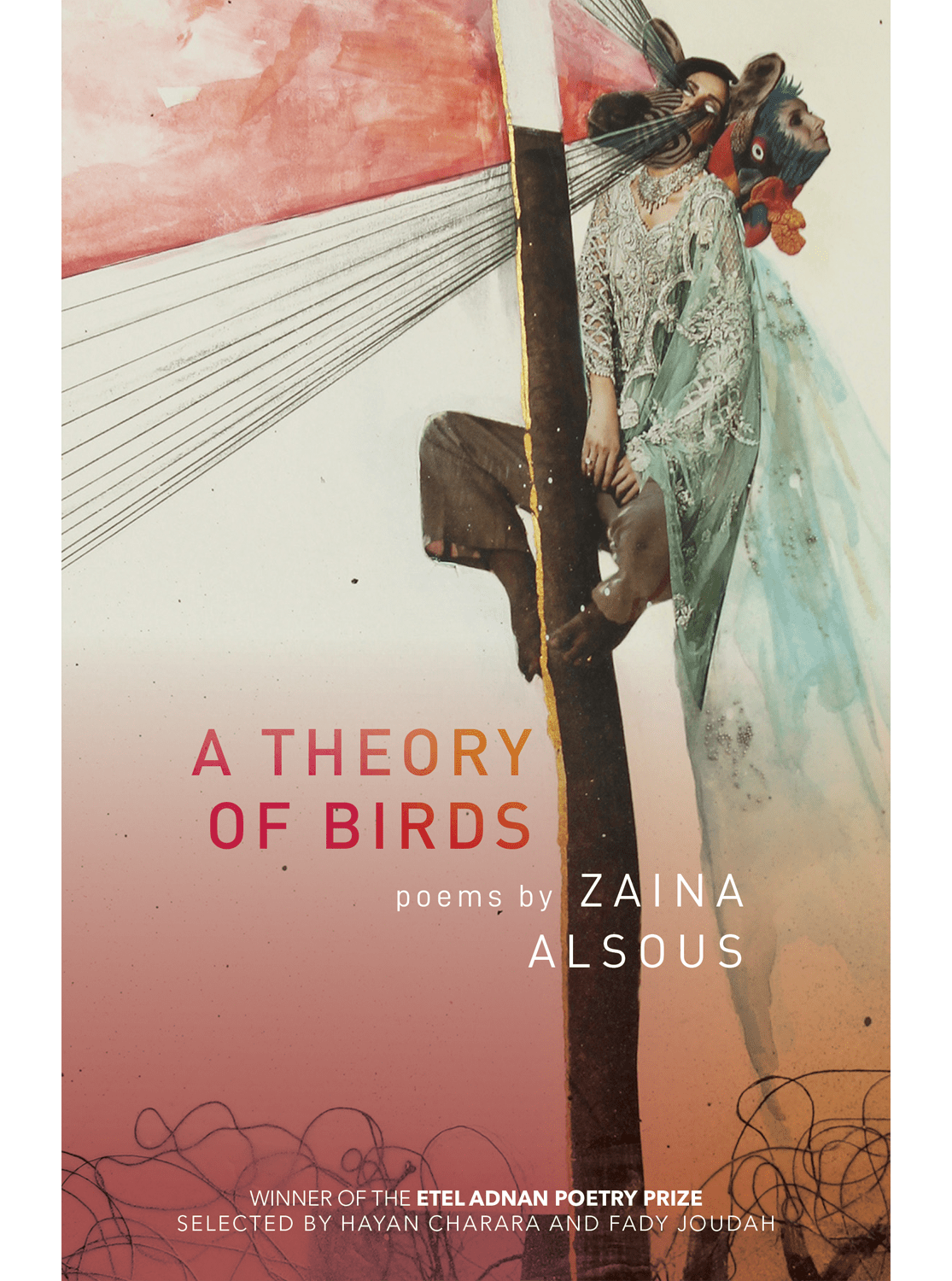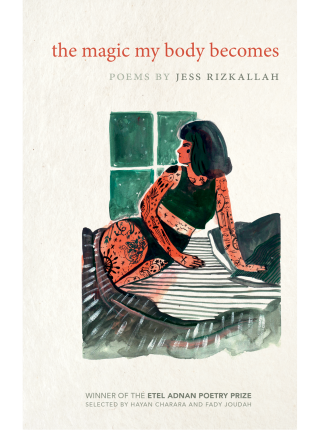Winner of the 2019 Etel Adnan Poetry Prize
Inside the dodo bird is a forest, Inside the forest
a peach analog, Inside the peach analog a woman, Inside
the woman a lake of funerals
This layering of bird, woman, place, technology, and ceremony, which begins this first full-length collection by Zaina Alsous, mirrors the layering of insights that marks the collection as a whole. The poems in A Theory of Birds draw on inherited memory, historical record, critical theory, alternative geographies, and sharp observation. In them, birds—particularly extinct species—become metaphor for the violences perpetrated on othered bodies under the colonial gaze.
Putting ecological preservation in conversation with Arab racial formation, state vernacular with the chatter of birds, Alsous explores how categorization can be a tool for detachment, domination, and erasure. Stretching their wings toward de-erasure, these poems—their subjects and their logics—refuse to stay put within a single category. This is poetry in support of a decolonized mind.

Zaina Alsous is an abolitionist and a daughter of the Palestinian diaspora.
“Alsous invites us on a journey (if we dare) deep into the heart of the world: language. Driven by the threat of extinction, the speakers in these poems carry themselves with a sense of urgency. The poems flit back and forth between hope against extinction and resignation to the end of the material world they inhabit.”
—Aiya Sakr, The Rumpus, January 2021
“This collection is aggressively soft and in a hurry—running towards the future while still looking over her shoulder to make sure no one is left behind. The metaphysical imagery invites disarray while insisting on our power as creators: ‘Infinite moon wandering ice ages, cellular oceans cusping margins.’ We are left with interminable ways of seeing, a new relationship to the language, and a manifesto: ‘When I say love, I mean these miracles are work.'”
—Maha Ahmed, The Adroit Journal, July 2020
“The arc of Zaina Alsous’s prizewinning debut collection, A Theory of Birds (2019), does nothing less than insist on an extended trajectory for lyric poetry. From its beginning, Alsous fends off the traditional, relentless inward gaze, which in Anglophone poetry’s self-interrogation often distracts from political realities, in favor of understanding the embodied and literary self as a fragmented part of the surrounding diasporic world. … Alsous’s poetics is politically radical not just nominally, or because of its allegiances or her biography. Her poems are at work chronicling and postulating a reordering of things, or a world dreamed into decolonial being, an abolition in language on the level of affect and feeling. Poetry and its properties—from sound to precision—is a lush mode of political thinking for Alsous, and it serves as both a figure and mode of practical liberation, given punishing, oppressive, or humiliating circumstances, wherein lament is permitted, and resilience can be summoned or renewed. … With her collection, Alsous generates a framework for a life in poetry, and a poetry of perpetual reimagining—or, as she puts it, “The Sun’s reflection inventing / another Sun.”
—Alicia Wright, Ploughshares, August 2020
“A Theory of Birds opens with phrases stitched with commas that are both light and startling: a grammar-flux that produces the effect of something falling out of or off the page. Zaina Alsous: ‘I entered through the empty cage, hips first.’ Zaina Alsous: ‘Can the map eat?’ The questions that follow invert their cardinal nouns, reverting to zero each time the next one is asked. I became curious about the nothing-everything of the book itself, the logic of voids and flight. A book that proposes a ‘collaboration with the dead’ but also a paradise of solar pathways and outcomes (intense joy). Alsous offers the reader a ‘previously’ as much as an ‘almost.’ A jar in France, a blonde hair in Fez: foreignness composes fragments in the shape of an ibis, a harp, a broken lantern, pinning them on a sky-red space: the page, which also shakes—shakes so hard that letters lose their place. And what would it be to write anyway? To love anyway? Zaina Alsous: ‘When I say home, I mean origin as a transitive verb. / When I say love, I mean these miracles are work.’”
—Bhanu Kapil
“Gabriel García Márquez wrote that Christopher Columbus’s Diario, ‘a book that speaks of fabulous plants and mythological lands,’ was the first example of magical literature in the Caribbean. This ‘magic’ is the colonizer’s ability to falsify a history, to rename what has already been discovered, to create taxonomies and eradicate the epistemologies of entire peoples. Zaina Alsous’s A Theory of Birds makes another kind of magic. Alsous writes, ‘While invading the New World, Columbus writes of sirens in / his notebooks, evoking the half-women, half-birds of Jason’s / Argonauts. Every time I look for women, I become more bird.’ Here is the magic of decolonization, the way it reconnects us past the romanticized past of the noble savage, past the Orientalist hybrids of an unimaginative colonial fiction, all the way to a poetics born of solidarity, of struggle, and pushing through the fissures that will eventually break apart empire. ‘Listen, next time, the flowers are naming themselves.’”
—Raquel Salas Rivera
Winner, 2020 The George Ellenbogen Poetry Award, Arab American Book Awards
Winner, 2020 Norma Farber Award (Poetry Society of America)
“In Zaina Alsous’ A Theory of Birds we are ushered into a re-calibration of the world, one intent on the eradication of that which has been oppressive and divisive. In these poems history unravels us in fragments, causing us to fold ourselves into a new definition of “self” and an unabashed rejection of our positions as “subjects.” The poems found here are an honest and open exploration of how we come into a sense of our own understanding in a postcolonial world. Alsous’ poems are driven by the asking, often posing sentient questions like “who translated kings and not birds?”; questions that cause us to think of redefinition. And while her poems are searing in their critiques of political, racial, and gendered domination, like all good artists she is poignant in her ability to implicate herself at every turn and help us break through the binaries we often use to define ourselves. Hers is an aesthetic of fragmentation as a collective piecing together. A Theory of Birds teaches us that the interior narratives, the often quiet things that make each of us whole, are the most essential.”
—Matthew Shenoda, Judge, 2020 Norma Farber Award

Every year the University of Arkansas Press, together with the Radius of Arab American Writers, awards the Etel Adnan Poetry Prize for a first or second book of poetry in English by a writer of Arab heritage. The series is edited by Hayan Charara and Fady Joudah and supported by the King Fahd Center for Middle East Studies at the University of Arkansas.

Adopted at: University of Miami
Course: MLL 322 Topics in Comparative Cultural Studies
Course Description: Interdisciplinary analysis of the political dynamics of contemporary culture and its historical foundations with a focus on ideology, social class, nationality, ethnicity, sexuality and/or gender.
Professor: Suja Sawafta
Term: Fall 2022
Adopted at: University of Miami
Course: MLL 370 Studies in Literature, Culture, and Science
An analysis, in a comparative or historical perspective, of the literary works that expose the deep interaction and mutual influence between literary or visual cultures and the sciences. Topics might include: Leonardo’s genius; technology at the turn of the 20th-century; 20th-century wars, the science behind them and their representations; Vesalius’s anatomical work and the philosophy and representation of the body in 16th-century Europe.
Professor: Suja Sawafta
Term: Fall 2022
Adopted at: University of Virginia
Course: ENGL 8596 Form and Theory of Poetry – Embodied Ecologies: Ecofeminist Poetry and Poetics
Course Description: “How can we listen across species,” asks Alexis Pauline Gumbs in Undrowned: Black Feminist Lessons from Marine Mammals, “across extinction, across harm?” And how can the practice of poetry extend the senses, aid us in listening and speaking to, touching, and moving in ethical relation to the imperiled more-than-human world? In books like Wendy Burk’s Tree Talks, Bhanu Kapil’s Humanimal, and Zaina Alsous’ A Theory of Birds, poets intend themselves toward vegetal, mammalian, and avian lives in order to examine not only what is knowable of other species, but also to investigate the effects and affects of western culture’s conflation of women and animals. Much contemporary ecofeminist poetry focuses not just on ethical relation to the more-than-human world, but also to registering the impacts of settler colonialism, enslavement, war, and imperialism on the intrinsic interconnectedness between species, ecosystems, humans, and human systems. This interdisciplinary course will introduce us to ten contemporary ecofeminist poets as well as to the ecocritical discourses that inform the work they’re doing. We’ll explore their poetry and relevant ecocritical thought through five topoi – Black Anthropocenes, Listening, Indigenous Tongues, Touching, and Humanimals. Trees, birds, wolves, and insects will accompany us through the semester as we too attempt to listen across species, “to see what happens,” writes Gumbs, when we “rethink and re-feel” our own “relations, possibilities, and practices” in conversation with more-than-human beings. Assignments will range from the creative to the critical, with an emphasis on process-led research. Poets, artists, and scholars of all disciplines welcome.
Professor: Brian Teare
Term: Spring 2022
Adopted at: Brown University
Course: LITR 0110B Poetry I.
Course Description: A workshop for students who have little or no previous experience in writing poetry.
Professor: Erica Ammann
Term: Spring 2021






